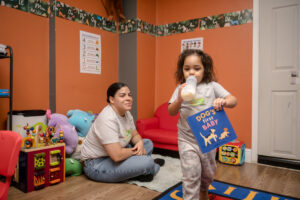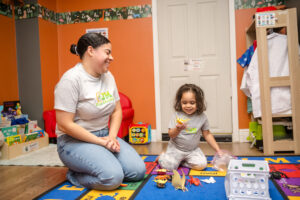
Healthy-Me Practices for Mental Wellness
Mental health is especially challenging and important during times of great uncertainty. In this blog post, home-based providers and caregivers share their healthy practices toward positive mental wellness.

Mental health is especially challenging and important during times of great uncertainty. In this blog post, home-based providers and caregivers share their healthy practices toward positive mental wellness.

Parents and advocates join with home-based providers on A Day Without Child Care to amplify how important supportive child care policy reform is for the workforce and communities.

Home Grown es una colaboración nacional de financiadores, cuidadores y proveedores que trabajan juntos para impulsar la creación de un sistema de cuidado infantil inclusivo donde el Cuidado Infantil Familiar (FCC) y el Cuidado de Familias, Amigos y Vecinos (FFN) sean visibles, valorados y cuenten con los recursos necesarios. Regístrese para obtener más información sobre

Home Grown is a national collaborative of funders, caregivers and providers working together to advance an inclusive child care system where Family Child Care (FCC) and Family, Friend and Neighbor (FFN) care is visible, valued and well-resourced. Register to learn more about joining our mission-driven community rooted in shared values. Let’s come together to advocate

Home Grown’s new values statement underscores the organization’s commitment to reimagining child care policies and systems through collaboration with home-based providers and the communities they serve. Read more.

Black and Brown communities have historically relied on home-based child care as a form of community cultural wealth and resilience even though this work has been consistently undervalued due to systemic inequities. Recognizing the strengths of providers and caregivers and investing in culturally rooted solutions can help shift the power in decision-making and help strengthen and support home-based child care.

At Home Grown, our work and focus are unchanged in 2025: We are working for a future where all children thrive and where the adults closest to our children, namely their parents and care providers, are valued and supported. Learn more about how we plan to persist in our mission.

Home-based child care providers share how they rest and care for themselves during the often busy and demanding holiday season.

In many states, family, friend and neighbor caregivers are exempt from licensing regulations and operate outside of publicly funded payment systems. The recommendations presented here emerged from focus groups conducted to learn how networks are responsive to the strengths and needs of the FFN sector.

This report explores the unique role and challenges faced by immigrant Family, Friend, and Neighbor (FFN) caregivers in Colorado, who provide essential child care for over half of the state’s children under age five. Despite their importance, these caregivers face significant obstacles in accessing federal support through the Child and Adult Care Food Program (CACFP), which reimburses child care providers for nutritious meals served to children. Many immigrant FFN caregivers, who are often license-exempt and care for children informally, face barriers to CACFP access, including fears of deportation, bureaucratic complexity, and language barriers.
To receive updates about Home Grown initiatives, investment opportunities, events, and more, subscribe to our newsletter. For additional questions, contact us at info@homegrownchildcare.org